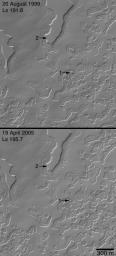Four Mars Years of Change
Caption:
23 May 2005
These two Mars Global Surveyor (MGS) Mars Orbiter Camera (MOC) images were acquired a little more than four Mars years apart. One Mars year is about 687 Earth days long. The two images show a portion of the south polar cap, which is composed of frozen, layered, carbon dioxide. Each Mars year since MGS has been observing the planet, the mesas and buttes composed of carbon dioxide have gotten a little bit smaller, and the pits and holes have become a little bit wider. The scarps formed in frozen carbon dioxide in the south polar region are retreating at an average rate of about 3 meters per Mars year. The example shown here includes an image obtained in August 1999, and a more recent picture from April 2005. Arrow "1" points to a dramatic example of the changes that have occurred; in this case a mesa shrank to a small butte in just four martian years. Arrow "2" indicates pits that developed in the cap layer of a carbon dioxide mesa that eroded during the same interval. Acquired during early southern spring, both images are illuminated by sunlight from the upper left.
Cataloging Keywords:
| Name |
Value |
Additional Values |
| Target |
Mars |
|
| System |
|
|
| Target Type |
Planet |
|
| Mission |
Mars Global Surveyor (MGS) |
|
| Instrument Host |
Mars Global Surveyor |
|
| Host Type |
Orbiter |
|
| Instrument |
Mars Orbiter Camera (MOC) |
|
| Detector |
|
|
| Extra Keywords |
Grayscale |
| Acquisition Date |
|
| Release Date |
2005-05-23 |
| Date in Caption |
2005-05-23 |
|
| Image Credit |
NASA/JPL/Malin Space Science Systems |
| Source |
photojournal.jpl.nasa.gov/catalog/PIA07972 |
| Identifier |
PIA07972 |

